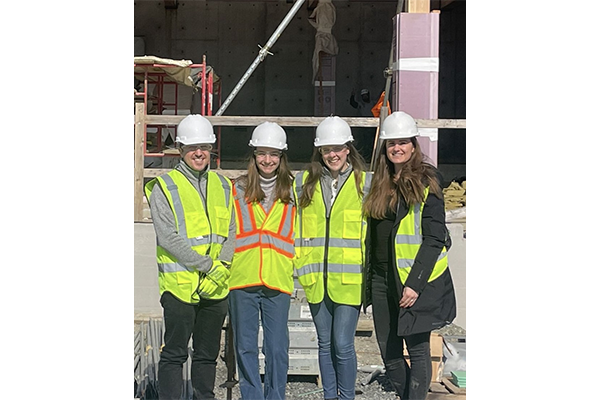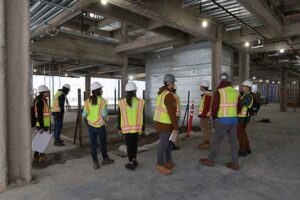Expanding a Structural Engineering Co-op into a Full-Time Position

Terenia Hankewycz, civil engineering, E’22, was able to go more in-depth with each co-op in the civil engineering industry. With a particular focus on structural engineering, she returned to one of her co-ops full-time after graduation.
Main photo: Terenia Hankewycz is second from the left.
Terenia Hankewycz, civil engineering, E’22, was unsure about majoring in civil engineering at first. She started her Northeastern journey as an undeclared engineer and eventually chose civil engineering, but she needed to have a better sense of what work she would be doing before she knew she made the right choice. Thankfully, her first co-op at Walker Consultants put those worries to rest.
“I got to see most of the structural side at Walker Consultants but also a bit of the transportation and construction management, but it helped me decide that structural was the way I wanted to go,” Hankewycz says.
About once a week at Walker, she went on site visits to observe concrete pours and conduct condition assessments of parking garages that the company had worked on. This enabled her to see processes that she could only discuss in class.
“That was helpful to see how things actually get built and how we can evaluate things that have been built,” Hankewycz says.
She also gained a foundational knowledge of Revit, an essential software that wasn’t covered in her courses but proved to be immensely useful in her co-ops.
By building on the skills she had learned at Walker and from her courses, Hankewycz was able to go more in-depth with her second co-op at Buro Happold. Her work primarily consisted of using software to make structural calculations. Due to the start of the COVID-19 pandemic halfway through the semester, Hankewycz switched to remote work, which took some getting used to.
“Besides the actual engineering skills that I picked up, I also had to deal with, as everyone did at that point, switching to remote and what impact that had on working life,” Hankewycz says. “With some help from my team, I made it work and I was able to continue to work pretty smoothly throughout the rest of the co-op.”

Hankewycz’s LeMessurier team at a site visit for the construction of Northeastern’s EXP building.
Hankewycz’s third co-op at LeMessurier again gave her a more in-depth look at structural engineering, including more complex calculations and additional phases of the construction process. By starting with foundational skills at Walker and taking on more advanced projects at Buro Happold and LeMessurier, she was able to take away something new from each of her co-ops.
CEE Associate Teaching Professor Nancy Varney, Hankewycz’s supervisor at LeMessurier and later a professor of hers, had a significant impact on Hankewycz’s experience, both as a co-op and as a student. During Hankewycz’s time at LeMessurier, Varney was consistently a guiding hand through her work, being patient and understanding all the while. By sharing the best advice she could offer, Varney mentored Hankewycz and made her a better structural engineer.
“Obviously a co-op is just not going to have the same level of understanding as someone who has had years of experience in the field,” Hankewycz says. “She was very willing to introduce what to her, I’m sure, were the most basic concepts but to me were something totally foreign.”
Co-op also gave Hankewycz a better understanding of her coursework. By having something real to attach to the concepts she learned in the classroom, she was able to recognize the purpose behind each pillar of structural engineering.
“I had already seen the practical applications of the calculations or the theories or whatever else we were learning in class, so it was easier to attach the knowledge to something tangible that I had already seen even if I hadn’t understood it at that time,” Hankewycz says.
After graduating in 2022, Hankewycz now works full-time at Buro Happold as a graduate structural engineer, though she is at the New York office instead of in Boston. She says that her time at the Boston office as a co-op helped form a vital connection that led to her securing her full-time position.
“[My co-op] allowed me to have that familiarity with the people there so that when I was applying for full-time positions, it was a bit easier for me to land my full-time position here,” Hankewycz says.
Although the office, the people and the projects are all different, the foundation she built as a co-op at the Boston office has served her well.
While at Northeastern, Hankewycz stayed involved with her fellow student engineers through Northeastern’s chapters of the American Society of Civil Engineers and Engineers Without Borders, or EWB. As a member of the Guatemala team, she worked on a school structure. Her team did calculations on the building, created structural plans and constructed a model in Revit. Her skills from her courses and from co-op made it possible for her to lead the model creation.
“I found EWB to be a very valuable experience because it was an opportunity for me to put my co-op skills to use,” Hankewycz says.
In the future, she is excited to see the tangible results of her projects at Buro Happold take shape.
“Having something that I worked on be created and be part of something that makes people’s lives better is a big goal,” Hankewycz says.